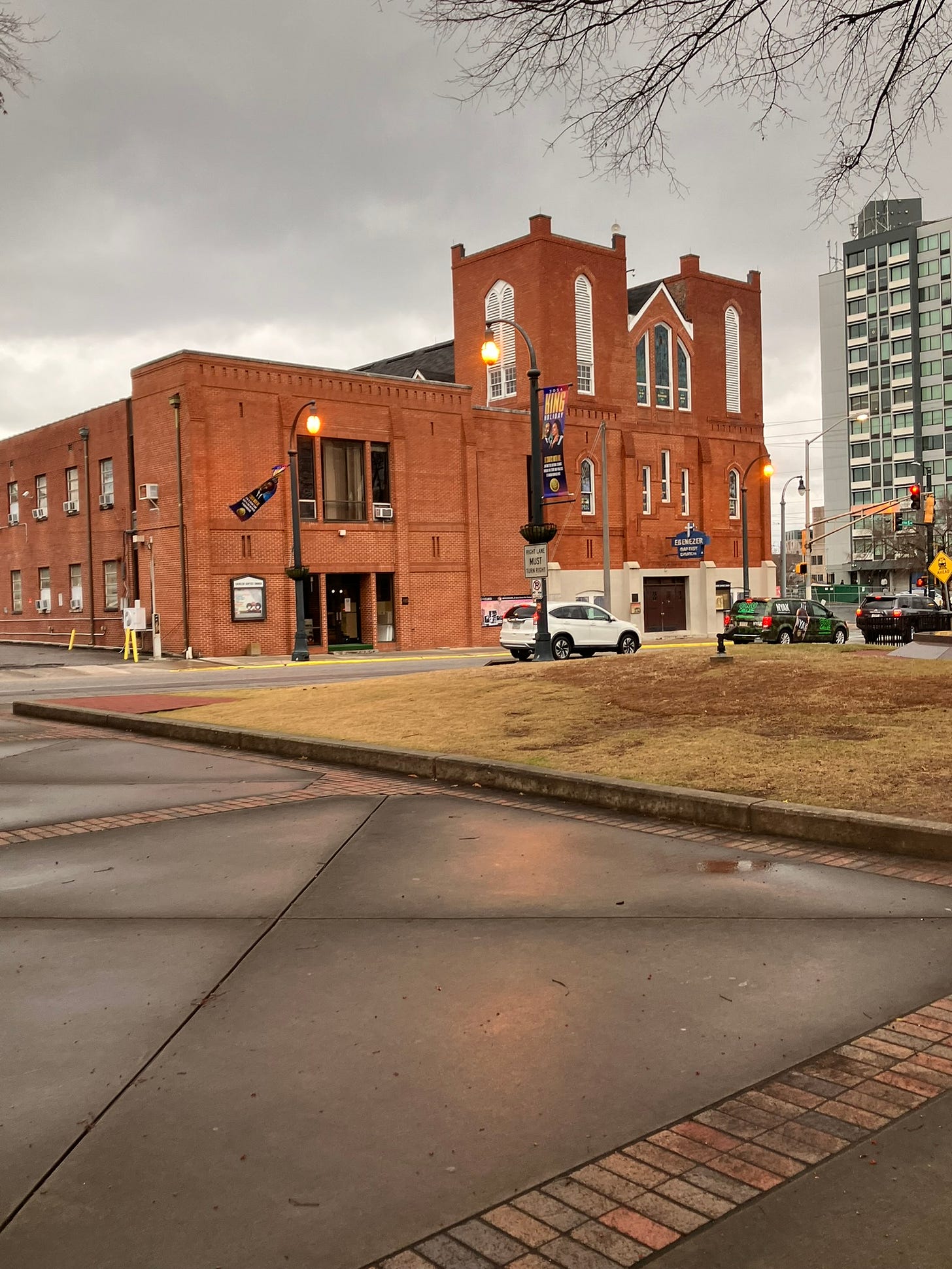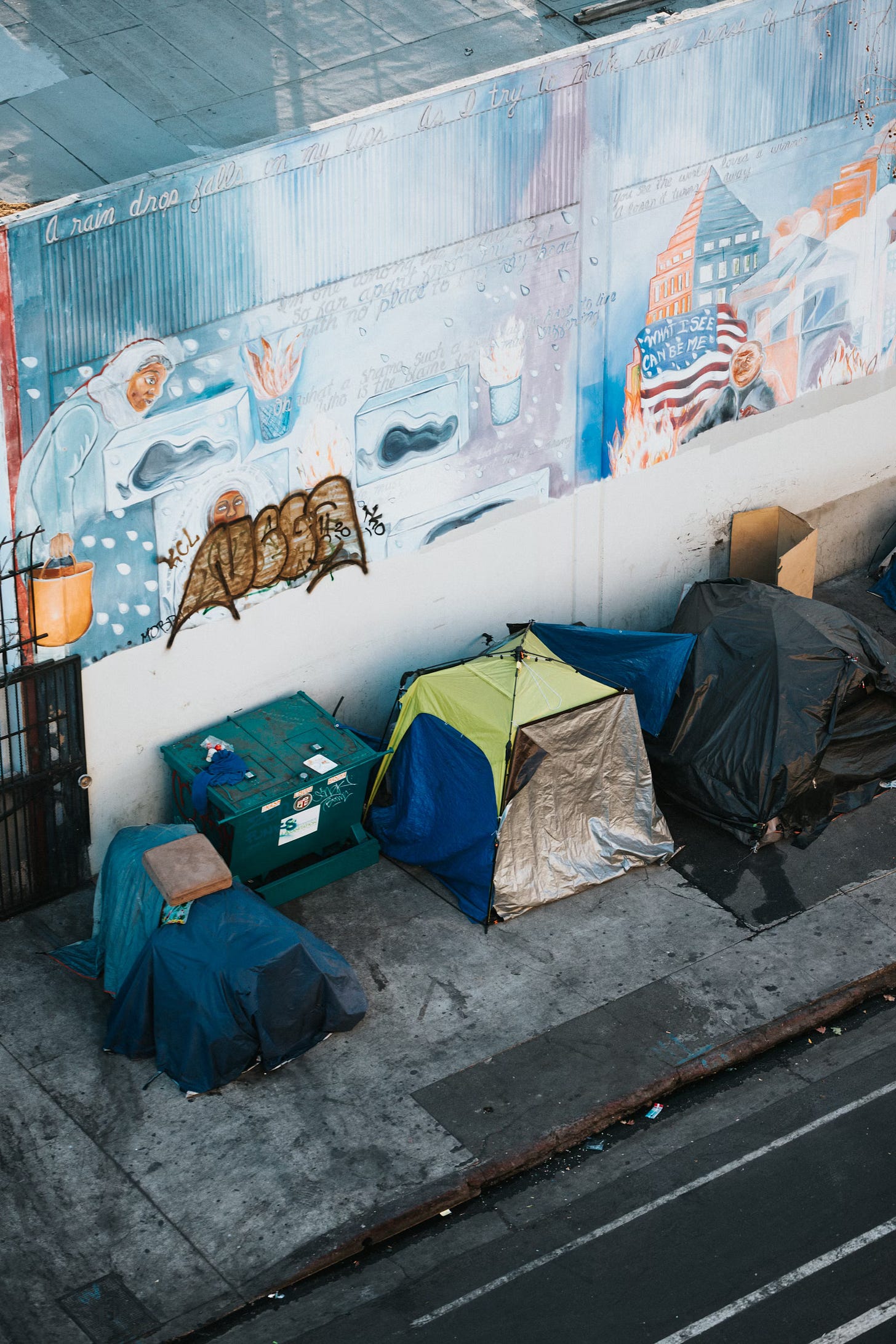Whenever I travel for speaking gigs one of my goals is to venture outside of the touristy hotel and restaurant districts and experience the city or small town for what it is. Feel its heartbeat. Notice where its tender moments are. How its pain points can sometimes reveal themselves across smoggy cityscapes. Or its beauty reflect in the surprising blossom of a Dogwood tree nestled in cement.
While in Atlanta presenting at the Georgia Health Policy Center at Georgia State University, my husband and I decided to travel on the light rail toward the King Historic District.
Once the pulsing center of a cultural and revolutionary movement, now a shrine and museum, and relic that highlights a vitally important and profound past. Dr. King’s church is still at the corner looking unassuming. Not like it once housed a giant. Not like the very fabric of society shook within its walls decades ago.
Yet, at the same time, this brick building begged for you to stop. Notice. Remember.
Ebenezer Baptist Church, Atlanta Georgia
The wind was cold. I forgot my good sweater. And I couldn’t stop staring:
The majesty of history juxtaposed with the real: poverty, trauma, racism, boarded-up buildings, empty mini vodka bottles along the sidewalk, camps in the city, with a rainbow of tarps held up against the February rain.
We walked for blocks looking.
It felt like we were walking with purpose, yet we didn’t know the way or where we were headed. As if we were looking forward to something and at the time didn’t know what it was. Or we were running from something we wanted desperately to forget.
This mural is on the wall of the Peach Cobbler Factory in Atlanta.
We stepped into a Peach Cobbler Factory because of course, I wanted peaches while I was in Georgia like any privileged tourist. I was already full from too much lunch but on top of full, I buried my belly with excess: Cinnamon. Cardamom. Brown sugar. Vanilla bean. Peach. Crème.
As I ate my dessert, I looked out the window towards the folks who were unhoused walking by, pushing carts with scuffed shoes, carrying the weight of years in their carts and eyes.
As we stood to leave, a man came in and immediately I could feel the staff person’s eyes on us. She moved towards the door where the man had just entered, leaving a trail of things—his belongings—outside.
“You aren’t supposed to be here,” she said.
“I need a ride. I need to get to another side of town.” His deep eyes pleaded with us. I wondered if the bottom of the ocean was in those eyes.
I looked at my husband and he gave me the look. The look that said I don’t know what to do but whatever it is, it’s not what you are thinking.
“You need to leave. You can’t ask for things here.” The peach cobbler lady continued, getting more and more upset.
The man shook his head and looked at me once more and walked away, the door dinging to announce he was gone.
I couldn’t help the tears.
The moment was painful with the unanswered ask that hung in the air like smoke.
The barren streets and boarded buildings with high rises of glass in the background cast shadows the color of dirty dollar bills.
Photo Credit: Nathan DumLao
“It’s okay. You don’t have to help. He’s probably going to buy drugs. We give them money and they buy drugs,” said the staff person again a matter of fact when she noticed I was crying.
I looked down into the peach cobbler and it was soup and I felt sick.
I was full to bursting.
He was asking, empty.
So what if it’s drugs? So what if it helps? —these were my first thoughts. How could I judge a life that I only walked past?
I told a friend recently that I like to travel because it makes me feel small.
Not insignificant, but right-sized.
It’s important to stop and notice our lives in the context of a bigger story.
*
As we continued to walk that day back to Peachtree Street and back to the towering high rises with fancy restaurants and beds with pillows and rooms with adjustable temperature control and back to feeling full again I wondered what it might mean to remember the walk. The trip. And that there is more beneath the reality of the work many of us do today in recovery.
The context is complex
Have you experienced an event or interaction that challenged you recently?
Share in the comments below.
I’d love to visit you because I believe that the time is NOW to reduce addiction and mental health stigma and provide more opportunities for people to get the support they need.
One of my passions is sharing about recovery, broadening the context of the work we do, exposing the layers of struggles—and joys—that may make up our lives today. I love talking about the recovery community and highlighting evidence-based research (my day job is working for a company that supports the federal government and other agencies with social service work and I get to do a LOT of research). I love sharing about personal stories of recovery. I love sharing more about how to support women, specifically, along a recovery road.
Check out some of the places I’ve been in the last year and am headed. I’d love to speak at your event. Contact me anytime if you’d like to chat more about inviting me to speak





